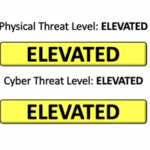
Faith-Based Daily Awareness Post 19 November 2025
Faith-Based Security Headlines
These updates are shared to help raise the situational awareness of Faith-Based organizations to best defend against and mitigate the impacts from all-hazards threats including physical security, cybersecurity, and natural disasters.
Here are the latest mass shooting numbers in the US in 2025
According to a November 17, 2025, article from KCCI, the United States has experienced more than 350 mass shootings so far this year, defined as incidents in which four or more people are injured or killed (excluding the shooter). As of November 1, these events have resulted in 315 deaths and over 1,600 injuries. Mass shootings remain more frequent now than they were a decade ago: between 2014 and 2024 there was an 85% increase in such events, with more than 5,500 deaths and 23,000 injuries attributed to them in that period. The piece also notes that despite their high visibility, mass shootings still account for only about 3% of all gun-homicide deaths in the U.S., according to an analysis of data from the Centers for Disease Control and Prevention by the Get the Facts Data Team. Geographically, the phenomenon is widespread: so far in 2025, 44 states plus Washington, D.C., have reported at least one mass shooting.
Analyst Comments: These numbers highlight the continued need for preparedness, situational awareness, and strong community reporting practices. Even though the overall totals appear lower than in some past years, the fact that mass-casualty incidents occur across nearly every state underscores the importance of consistent safety planning for organizations, houses of worship, schools, and public-facing institutions. The data also reinforces that everyday community engagement such as noticing concerning behaviors, following established threat-reporting channels, and participating in regular safety exercises can have an outsized impact. Focusing on training, coordination with local law enforcement, and resilience planning remains essential regardless of the broader trends.
The Right Spread A Wild Story About A Foiled Plot To Bomb A Synagogue
A Brazilian national and whistleblower for Project Veritas claimed that two Brazilians allegedly involved in the Tren de Aragua gang planned to bomb a Chabad synagogue in Florida and traffic minors. Project Veritas published the allegations in detail, including screenshots of texts and WhatsApp messages, presenting them as proof of a foiled terror plot. But according to Rolling Stone, key parts of the story don’t check out: federal authorities say there’s no confirmed terrorism investigation, and the two men that were named by the perpetrator are simply in ICE custody for immigration violations. Rolling Stone also digs into the credibility given the perpetrator is under indictment in the U.S. for immigration-fraud related to posing as an attorney, and has a history of alleged forgery. Digital-forensics experts, according to the report, have raised doubts about the authenticity of the messaging screenshots that Project Veritas published.
Analyst Comments: This case underscores why houses of worship and community organizations should consider maintaining strong information-vetting practices, especially when claims involve threats or terrorism. False or exaggerated reports can create unnecessary fear, strain community relationships, and distract security teams from credible risks. Leaders should consider relying on verified information from law enforcement, trusted security partners, and established ISAO/ISAC channels, rather than reacting to unconfirmed online claims. At the same time, communities benefit from staying alert to behavioral warning signs, building strong liaison relationships with local authorities, and maintaining clear internal reporting pathways. Balancing vigilance with verification helps ensure that faith communities respond effectively to real threats while avoiding the disruption and harm that misinformation can cause.
Weekly Security Sprint EP 135. Happy Bday CISA! Cyber risks and reports and self reflection from an attack victim
The Gate 15 Security Sprint is a weekly rundown of the week’s notable all-hazards security news, risks and threats and some of the key focus areas for organizations to consider behind the headlines. Gate 15 team members discuss physical security, cybersecurity, natural hazards, health threats and other issues across our environment.
In this week’s Weekly Security Sprint Dave and Andy covered the following topics:
- Happy Birthday to CISA! The Cybersecurity and Infrastructure Security Agency turned seven on Sunday.
- Government funding bill temporarily revives cybersecurity information-sharing law
- The Gate 15 Interview EP 64: Cody Barrow, CEO, EclecticlQ. “Nothing in cyber happens without a reason.”
- Faith-Based (U.S.): FB-ISAO Newsletter, v7, Issue 10
Information on other Gate 15 podcasts can be found at Podcasts (gate15.global).
More Faith-Based Stories
- Alt-right anti-Islam protesters in Dearborn overwhelmed by Muslim activists
- Greenville Co. church’s longtime food bank destroyed by fire
- Creep accused of church bathroom assault
- Conway man arrested on terroristic threatening charge for threatening to shoot up church
- CAIR-NY Welcomes Guilty Plea of Neo-Nazi who Tried to Recruit People to Hand Out Poisoned Candy to Jewish Children
- Texas governor calls CAIR a terrorist organization, says he will enforce penalties
- CAIR Sends Formal Response Letter to Texas Governor Abbott Condemning ‘Defamatory and Lawless’ Proclamation
- US school that expelled Jews after antisemitic bullying apologizes in settlement
- North Texas houses of worship lock doors, tighten security amid surge in targeted violence
- Mass: Faith-Based Safety & Security Seminar Welcomes Hundreds of Leaders from Across the Commonwealth
- American Baptist Leaders Praise Clergy Protesting ICE
- Jewish leaders link climate disinformation to antisemitism
- States and Localities May Get More Federal Cybersecurity Money
- US federal workers would lose whistleblower safeguards under Trump rule
- United States, Australia, and United Kingdom Sanction Russian Cybercrime Infrastructure Supporting Ransomware
- Bulletproof Defense: Mitigating Risks From Bulletproof Hosting Providers
- The realities of CISO burnout and exhaustion
- The polar vortex is about to bring a wild weather pattern change
- US health data still recovering after federal shutdown
- Cloudflare outage on November 18, 2025
More Security-Focused Content

The FB-ISAO’s sponsor Gate 15 publishes a daily newsletter called the SUN. Curated from their open source intelligence collection process, the SUN informs leaders and analysts with the critical news of the day and provides a holistic look at the current global, all-hazards threat environment. Ahead of the daily news cycle, the SUN allows current situational awareness into the topics that will impact your organization.


